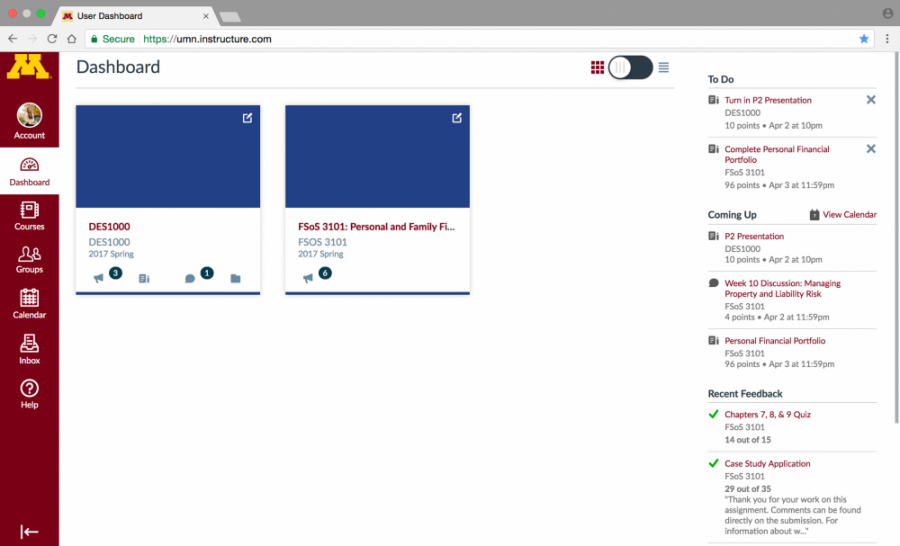This spring, the University of Minnesota may leave Moodle for a new learning management system.
Academic technology officials recommend switching to Canvas, a new LMS, rather than staying with Moodle for a number of reasons, including Moodle’s limited structural capacity. Reports from faculty and students, who have been piloting Canvas since 2015, show a majority of both groups prefer Canvas.
University Learning Technology Advisors, a faculty and administrative committee launched last fall, will formally recommend whether the school should change to Canvas or use a cloud-based version of Moodle in April, which would cost the same. The movement to switch was sparked by a December proposal from the University Office of Information Technology, said ULTA chair Lee-Ann Breuch.
Provost Karen Hanson and OIT Interim Vice President Bernard Gulachek will make the final decision this spring.
The AT-OIT proposal recommends the University adopt Canvas, stating that the current Moodle system is unsustainable because it isn’t designed for institutions as large as the University. This has led to recurring unexpected outages and slow service, the proposal states.
Moodle has become increasingly resource-intensive over the years, said Donalee Attardo, senior director of Academic Technology. ULTA is also considering switching to a cloud-based version of Moodle because right now, the hardware that runs Moodle on all University campuses is housed at the Twin Cities campus, she said.
Cloud-based Moodle would require continued staff support and “impede progress toward meeting strategic institutional goals,” the proposal says.
It states that Canvas would be the “most cost-efficient and effective way” for the University to provide key features of digital learning like personalization, collaboration, accessibility and universal design.
The ULTA committee, which launched last fall and is tasked with making recommendations on University Academic Technology decisions, has heard feedback from faculty, students and officials about both options. Seventy-six instructors and over 4,000 students spread across each University campus participated in the fall 2016 pilot.
According to a survey of that pilot group, about 80 percent of instructors and 60 percent of students said the University should switch to Canvas.
But many instructors remain loyal to Moodle, Breuch said. While some faculty simply dislike Canvas, others are concerned about the possible effort required to transition to a new system.
Ann Hill Duin, a writing studies professor, has piloted Canvas this past school year. She said she prefers Canvas over Moodle in part because it offers better learning analytics.
While Moodle records most of the same data as Canvas — like students’ participation, missed assignments and grades — only Canvas displays all of this information in one dashboard, she said.
Canvas also allows instructors to share analytics with students — with personal information omitted — so they can see how they compare to the class.
Hill Duin said Canvas analytics helped her identify which students needed extra support.
In general, Canvas looks and operates similar to Moodle but has a cleaner, easier-to-navigate feel, Hill Duin said.
Questions about Unizin
Additionally, ULTA is considering whether the University should remain part of Unizin, the organization that developed Canvas. Unizin, a consortium of 11 colleges that the University joined in 2014, provides digital teaching and learning resources to its university members.
The universities form the board of directors that guides the organization’s staff and CEO, Attardo said. Attardo is one of the University’s two representatives to Unizin’s board of directors.
The AT-OIT proposal states staying in Unizin “will provide digital tools and services for teaching and learning that University faculty and staff will ask for and expect in the near future” in areas like digital content, platforms and learning analytics.
ULTA still has many questions about Unizin, ranging from understanding what it does to how it benefits the University, Breuch said.
ULTA and OIT officials have presented information about the LMS decision-making process to several University committees and hosted vendor demos as well as evaluation forums open to the public that will continue through March.


